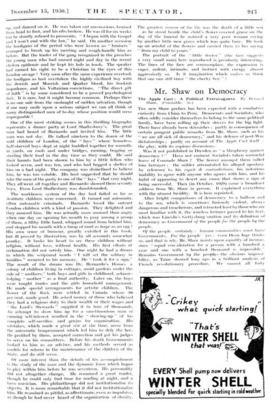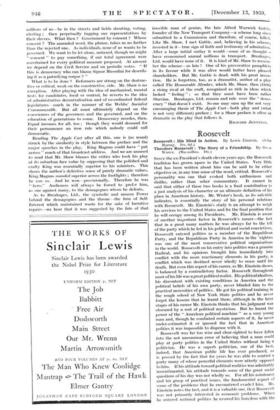Mr. Shaw on Democracy
The Apple Curt : A Political F-xtravaganza. By liertiald Shaw. (Constable. 5s.)
Tin,. new Shaw preface has been expeeted with a emolaati,c curiosity from China to Pent 1)ettioentts and Sirialists, la. often oddly consider themselves to belong to the sante political have been rolling up their sleeves for the big fight. There have already been skirmishes : partly ill C011SCIIICIWC of eertain pungent publie tvittarks from Mr. Shaw_ suelt as his " we are all sick of democracy,'" and his defence of post-IVar dictatorships ; partly on account of The .1fIrle earl itself - the play. with its copious discussions.
Was it not prohibited in 1)resden as " a blasphemy against demovratcy ? " Have not eminent Si IVI:1 list , taken sorrowful leave of Comrade Shaw ? The liereer ;amongst them called him betrayer ; the milder attenutated his alleged apostasy by reference to his esprit de ormirodielicoos, his IllItoriola, inability to agree with anyone trim agrees with him, and his habit of appearing to desert any cause that shows a sign 1■1' being successful. 'risen (in October, 19211) came a broadcast address from Mr. Shaw in person. It explained everything with the utmost lucidity. It is here reprinted.
.'after bright eomparisons of democramy to a balloon and to the sea, wide!' is sometimes furiously violent, ;always dangerous and treacherous, and is trusted Ica ,t lay those wl are most f 'liar with it, the wireless lecturer tam.sed to his text. which was Lincoln's Gettysburg ontli011 and Is definition of democracy as Government of the people for the pimple by the
l/C1/1/lC.
of the pe"pie ,ertaini■ hum.. niu.t Government,. For the people ye. l'N VI I Dean Inge thinks so, and that is wIr.. Mr. Shaw insists upon equality of income. since " equal cotc.identlion for a person with a hundred a year and one with a I !red tl iiiii sand is impossible." Remains Government by the people—the obvious impossi- bility, as Taine showed long ago in at brilliant autal■sis it 1:1•1•11(.1) revolutionary procedure. NV° calmot all forty
niillions of us—be in the streets and fields shouting, voting, electing ; then perpetually tugging our representatives by their sleeves. What then ? Government by consent ? Whose consent ? The amended word, the phrase, takes us no farther than the rejected one. As individuals, none of us wants to be governed. We want to be let alone, untaxed, though we might consent" to pay something, if our total agreement were ascertained for every political measure proposed. At present we depend on the Civil Service and on periodic votes. "If this is democracy who can blame Signor Mussolini for describ- ing it as a putrefying corpse ? "
What is to be done ? Reformers are strong on the destruc- t iNT or critical, weak on the constructive, side. Mr. Shaw is no exception. After playing with the idea of mechanical, mental tests for candidates, local or central, he reverts to the idea of administrative decentralisation and of co-ordinated federal legislatures —much in the manner of the Webbs' Socialist Commonwealth. But all must ultimately depend on the consciences of the governors and the governed, and on the education of generations to come. Democracy recedes, then. Equal incomes for all, too ; though they would demand for their permanence an iron rule which nobody could call democratic.
Reading The Apple Cart after all this, one is (as usual) struck by the similarity in style between the preface and the major speeches in the play. King Magnus could have "put across" much of that broadcast address. And we are amused to read that Mr. Shaw blames the critics who took his play at its suburban face value by supposing that the polished and crafty King was essentially superior to his ministers. This shows the author's defective sense of purely dramatic values. King Magnus sounded superior across the footlights ; therefore he was so. And he won—provisionally. Therefore he was " hero." Audiences will always be forced to prefer him, as one against many, to the demagogues whom he defeats.
As to Breakages, Ltd., the symbolic and unseen Power behind the demagogues and the throne—the firm of Self- Interest which maintained waste for the sake of lucrative repairs—we hear that it was suggested by the fate of that
irascible man of genius, the late Alfred Warwick Cattle, founder of the New Transport Company—a scheme long since submitted to a Commission and therefore, of course, killed. Like Mr. Shaw, I met Gattie, and, believing in his scheme, invested in it—true sign of faith and testimony of admiration. After a large initial outlay it would—some of us thought_ have economised annual millions in transport. Breakages. Ltd. would have none of it. It is kind of Mr. Shaw to remem- ber the scheme—so late ! One of his provocative pamphlets in its favour while it was alive would better have pleased shareholders. But Mr. Gattic is dead, with his great inven- tion. He is forgotten, too, as a dramatist, author of a play called The Honourable Member, which Mr. Shaw, then (1896) a rising rival at the craft, recognized as rich in ideas which lacked feeling " ; so that they must have been rather Shavian. Breakages, Ltd. remain and rule over the "demo- cracy " that doesn't exist. So one may sum up the not very encouraging thesis of The Apple Cart—both play and (what is not very different) preface ; for a Shaw preface is often as dramatic as the play that follows it.
RICIIARD JENNINGS.















































 Previous page
Previous page